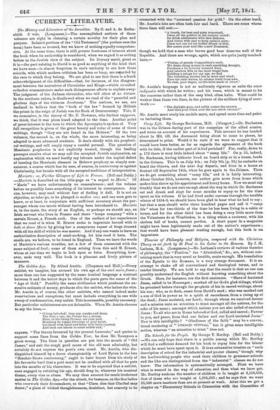CURRENT LITERATURE.
The History and Literature of the Israelites. By C. and A. de Roths- child. 2 vols. (Longmans.)—The accomplished authors of these volumes are right in claiming a certain novelty for their plan and purpose. Isolated portions of the "Old Testament" (the preface uses the term) have been no treated, but we know of nothing equally comprehen- sive. At the same timo, there is still greater freshness of interest about the book when its authorship is considered, when we regard it as setting before us the Jewish view of the subject. Its literary merit, great as it is—the part relating to David is as good as anything of the kind that we have seen—is almost forgotten in one's curiosity to see how these records, with which modern criticism has been so busy, are regarded by the race to which they belong. We are glad to see that there is a frank acknowledgment of the difficulties—that, for instance, of the disagree-. meat between the narratives of Chronicles and Kings—which so-called orthodox commentators make such disingenuous efforts to explain away- The judgment of the Judean chronicler, who will allow of no virtues in the northern rulers, is disallowed when we read of the "peaceful and glorious days of the virtuous Jeroboam." The authors, we see, are inclined to believe that the "book of the law" formed by Hilkiah the priest in the reign of Josiah was the Book of Deuteronomy. This, if 'we remember, is the theory of Mr. F. Newman, who farther supposes, we think, that it was pions fraud adapted to the time. Another point of great interest is the tone in which the Apocrypha is spoken of. Very fall recognition is given of the great beauty and value of some of these writings, though "they are not found in the Hebrew." Of the two volumes, the second is, on the whole, the more interesting, as being adapted to more advanced students. It deals chiefly with the propheti- cal writings, and will amply repay a careful perusal. The question of Messianic prophecies is not explicitly treated, though the leading passages receive what we may call the accepted Jewish explanation, an explanation which we need hardly say labours under the capital defect of treating the Messianic element in Hebrew prophecy as simply non- existent, a course which has its uses, of coarse, in controversy as against Christianity, but breaks with all the accepted traditicms of interpretation.


































 Previous page
Previous page